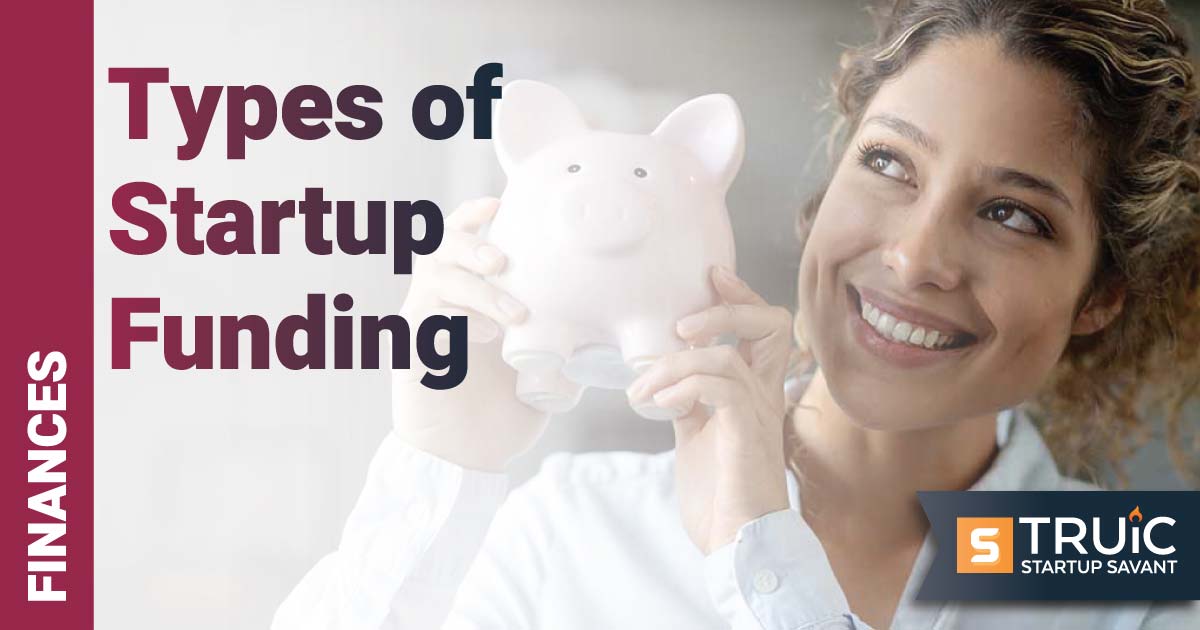Types of Funding for Startups

Last Updated: By TRUiC Team
If you’re thinking about starting a startup or simply looking for ways to grow an existing business, your first thought is probably how you’re going to fund your entrepreneurial venture. Startup funding comes in many different forms, from loans to equity funding. To find the right funding for your startup’s needs, keep reading to discover the most common types of startup funding and decide which one is right for you and your business.
Startup Funding Types
There are a myriad of startup funding options available to founders. Finding the right funding source for your startup is dependent on honestly assessing your startup costs and the amount of growth your company has the potential to achieve. To raise funds for your startup, read these top types of startup funding and decipher the right method for your business.
Bootstrapping
For many entrepreneurs, funding their startup is done by using their own personal savings. This funding method is also known as bootstrapping. Essentially, you invest your own savings or capital instead of funding your startup with outside sources.
Once your startup is established, your initial profits are invested back into the company until your startup experiences substantial growth or you receive outside funding.
Pros
- Bootstrapping allows you to fund your startup without owing money to a lender, therefore, all profits are put back into the business.
- Since you’re using your own money, you are able to do whatever you want with it (unlike other funding options that have strict requirements as to how the funding is spent).
- All of your profits are able to go back into your company to grow and maintain the startup
Cons
- By utilizing your own savings, you absorb all of the monetary risks to launch your startup.
- Saving enough money to bankroll your own startup can take time and requires sacrifices in order to squirrel away enough to fund the business.
- Unless you have a great deal of money saved, your options are limited compared to receiving higher funding over from an outside source.
Friends & Family
If you’ve got friends and/or family that are interested in financially supporting your business venture, consider doing a friends and family loan. This isn’t quite as simple as asking for a couple of bucks for gas; this type of loan is dependent on clear communication and agreed-upon conditions. Four steps to respectfully source funding from family and friends: Present your case, propose clear repayment terms, share your backup plan, then create a written agreement.
Pros
- You’re securing financing from people you trust.
- Family and friends care about your goals and the vision you have for your startup company.
- You aren’t typically releasing ownership of the company.
Cons
- Mixing business with your personal life can get messy. If your startup fails or hits roadblocks, it could interfere with your personal relationships.
- Family and friends may feel they aren’t able to say no to your inquiry about financing the startup, which can cause your relationship to turn rocky.
- Friends and family may not be comfortable pointing out potential problems and room for improvement within your proposed startup model.
Startup Grants
Startup grants are essentially free money to launch, operate, or maintain your startup. This means there is no requirement to repay the money you are granted. You can obtain startup grants by researching for the ones you qualify for and submitting an application. The application process can vary depending on the grantor.
Pros
- You aren’t required to repay startup grants.
- Many startup grants also come with valuable business tools and resources.
- For technology-focused startups, government contracts are sometimes available for technology development and innovation.
Cons
- Startup grants typically include requirements for how the money will be used that must be followed, or the grant money will need to be repaid.
- This type of funding usually involves a highly competitive application process.
- Most startup grants have very specific qualifications you and your startup company must meet in order to be given funding.
Startup Loans
Unlike startup grants, startup loans are funding you are required to repay over time. Traditional business loans can be acquired from business lenders such as banks or other lending institutions. Every bank loan and lender will have different requirements and application processes, but you should expect to need a well-crafted business plan to start.
Pros
- You retain ownership of your startup rather than trading in equity.
- Startup loans allow you to build business credit.
- You won’t be tapping into your personal savings, which mitigates your personal financial risk.
Cons
- Startup loans can be very hard to qualify for, and the application process can be time-consuming.
- Monthly payments can make investing profits back into your startup more difficult.
- Newer startups may find it difficult to find startup loans due to lack of longevity and credit issues.
Crowdfunding
Crowdfunding platforms have revolutionized the way startups are funded. With crowdfunding, you can pitch your startup concept online as well as additional information and receive funding from a multitude of sources from around the world.
Generally, crowdfunding doesn’t require repayment; however, with equity crowdfunding, investors are able to receive compensation for their investment in the form of shares or revenue shares.
Pros
- Crowdfunding doesn’t typically require repayment unless you’re engaged in equity crowdfunding.
- Rather than sourcing funds from one source, you can gather funding from a larger group of donors.
- With crowdfunding, you aren’t relinquishing any ownership of the company.
Cons
- Crowdfunding is dependent on multiple sources financing your project rather than establishing reliable funding from one source.
- Crowdfunding can be a saturated market; therefore, it’s difficult to obtain funding.
- You will be responsible for juggling multiple deals and investors in order to secure the funding.
Equity Crowdfunding
Equity crowdfunding is essentially obtaining funding through the exchange of securities such as shares, debt, or revenue shares providing investors with incentives. The key factor in equity crowdfunding is that while investors are buying shares of the company, it is still privately owned and therefore not listed on the stock exchange.
Angel Investors
Angel investors provide funding for startups in hopes of a high return on investment (ROI). Typically, angel investors are people with an excess of money to spend on risky investments. These investors often provide funding during the early stages of a startup when it can be difficult to secure funding.
Pros
- Rather than funding that requires repayment, angel investors are repaid through return on investment.
- Angel investors are far less risky than debt funding, such as startup loans.
- Angel investors provide credibility to your startup and jumpstart projects in their early stages that would otherwise be passed up by other lenders.
Cons
- Angel investors typically take an equity position in the company instead of requiring repayment, which means you lose some control over your company.
- Profits are split with angel investors once the business is sold.
- You maintain only part ownership.
Venture Capitalists
Venture capital is money deployed by venture capital (VC) firms. VCs invest in startups to gain profit as the company grows. They typically will take an active role in the business, sit on the board of directors, or request to become part-owner of the startup. Since venture capital investments are made in exchange for equity rather than debt, your startup will need to show promise of high-growth potential in order to secure this type of funding.
Pros
- Rather than funding that requires repayment, venture capital is repaid through equity by way of return on investment.
- For startups with high startup capital needed, venture capitalists are able to fund projects that may be too risky for others to take on.
- Venture capital investments set startups up for rapid, extensive growth that would not be otherwise possible with a loan through a bank or other lending institution.
Cons
- Venture capitalists typically opt to become board members or take an active role in the company, which relinquishes some control over the startup.
- Venture capitalists are looking for startups that are poised for rapid growth, which is a goal that not all startups can accomplish.
- Minority ownership is possible depending on the equity in the company that is exchanged for venture capital.
Series Funding
Series funding is a type of equity financing that gives investors a share in the company in exchange for their investment in your startup. This type of funding is typically through a venture capital firm, angel investors, or a combination of the two. Each series The rest of the series follows as the startup grows and produces revenue.
Pre-Seed Funding
Pre-seed funding is a type of early stage startup funding that startup founders can raise to build their MVP, validate their business idea, or conduct market research in the early stages. This is typically a small round of initial investment not taken on by all startups.
Seed Funding
Seed funding is often a more substantial round than pre-seed funding and it is more common than pre-seed rounds. This type of investment can be raised through friends and family rounds, venture capital investment, or crowdfunding. A seed round generates capital that can be used to prove the business model is viable and even go to market.
Series A Financing
The step after seed funding, Series A funding, requires an in-depth business plan as well as general momentum for the company, such as users, revenue, or whatever the key performance indicators are for that startup. The startup isn’t required to prove that the business plan works yet, just that there is interest and potential for rapid growth.
Series B Financing
Once a startup has established itself and creates an interested market, that’s where Series B funding comes in. Essentially, this series of funding is used for startups with momentum that need funds in order to continue expansion. This phase includes growing not only your customer base but your team as well.
Series C Financing
Series C funding is for startups that are doing well enough that they are able to continue expansion into new markets, potentially acquire other businesses, develop new products, and commonly expand their reach internationally. In addition, startups in the Series C financing phase may be interested in increasing their valuation in order to be acquired themselves or to go public. Many companies finish raising funds at this point.
Series D Financing
Series D financing can be at play for a few reasons: the company is looking to continue growing its valuation before going public or being acquired, or if the startup hasn’t reached the expected growth potential set forth prior. There are times, as well, that startup companies simply want to remain private companies at this time. Few companies make it to this phase of series financing.
Series E Financing
Series E financing is uncommon, with few startups getting to this phase of funding. The reasons a startup may seek Series E financing is the same as Series D financing; either they are looking to increase their valuation, they haven’t met their expected growth potential, or they want to stay private for longer than is common.
Pros
- No-debt financing (so, in a way, this is free money to start your business).
- Build professional connections and credibility through your investors.
- This type of funding is built to support your startup’s rapid growth.
Cons
- By taking on investors, you are releasing some of the ownership you have in the company to them.
- This type of funding is a great way to accelerate your startup’s growth and infrastructure; however, if revenue doesn’t parallel the momentum, your company could be in financial trouble.
- Securing this type of funding is time-consuming and taxing.


